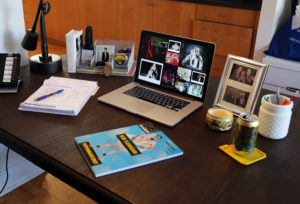Meet Kasper Woldtvedt, Project Manager
An on-the-ground troubadour for Barrett Barrera Projects, Manager Kasper Woldtvedt handles day-to-day challenges with pluck and enthusiasm. With a BFA from Webster University, Woldtvedt is the most recent full-time hire at the company, a smart trouble-shooter with her eyes on the big picture.
There are many overlapping projects ongoing at Barrett Barrera Projects. How are you involved specifically?
With all of the tasks we have going on, I get a little bit more micro-focused and nitty-gritty on how things are executed. I’m the person who’s on the ground saying, “We need to rent a truck. We need to rent a forklift.” Or, “We need to do X, Y, and Z. This is how I recommend we do this.” As far as Barrett Barrera objects and collections go, I’m more focused on how those relate to projects, creating the systems for how our projects function. I might go in and ask, “Why is it like this? What are our goals as a company?” I find out on a macro-level from management what is needed, and then tackle it on the micro. It’s a lot of creative problem-solving on my end.

How does your background inform this problem-solving savvy?
I got my degree in graphic design—in a fine arts focused program with painters, sculptors, and other artists. I spent most of my time working as an artist, but I also spent time working on marketable applications—like illustration and creating proposals. Through that program I definitely have more of a business mind in terms of how to apply the creative concepts I was learning. That practice really informed me here. When you have an idea and you want something to happen, you have to figure out what you need to do. It’s a lot of creative research—trying to approach things from a new perspective. That’s helped me think of projects here on a long-term scale.
Also, I golf. And golfing is about working backwards. I like doing that, approaching a project from the end result, and working back from there.
The way you think in the terrain of a golf course combines with the collaborative impulse of your BFA experience.
In college I learned about happy accidents. They helped me understand how to think quickly when things don’t go your way—and how to retain composure professionally. It’s important to maintain a level of confidence in what you’re doing, and in the skills you know how to back. We’re often on a really fast-paced schedule here—you have to be movin’ and groovin’. You have to be nimble on your feet. Which I love—it keeps me engaged in a way that I think I do my best thinking and my best work. I love that one day I might be helping with a proposal and then one day I might be unpacking garments or working on crate logistics. I love that.
How it’s not just conceptual labor, it’s moving and doing things with your hands.
Some of it’s pretty cut-and-dried-get-things-done. It’s nice to accomplish quick tasks, and it’s nice to accomplish long-term tasks. So having that balance is really motivating. Everything we do is a group effort. So it’s always really motivating when your tasks have benefited someone else whom you respect within the company.
The multifaceted nature of your job works well for you.
It does—and that’s the nice thing working with the management that’s in place. I haven’t worked with a company like that before. A lot of times in the past, I was at the will of what the company needed, and I just did it. That’s why we have so much success at what we do. Because Barrett Barrera is playing to our talents and capabilities—which is really cool and empowering. As a woman who’s worked in the corporate world before, especially in tech—which was highly driven by men—I never felt that type of empowerment before. It’s really exciting to me, both personally and professionally, to feel that on a daily basis.
What has surprised you most in your position?
I didn’t realize how internationally driven our projects are. Yes, we had a show with Charlie le Mindu here, but there was also a show in Paris. The kind of relationships that we work on are very global, and I didn’t realize that till I started working for the company. You see how much more broad the vision is—of art and fashion and music and the performative gray area—when you take it outside the traditional white cube structure.
